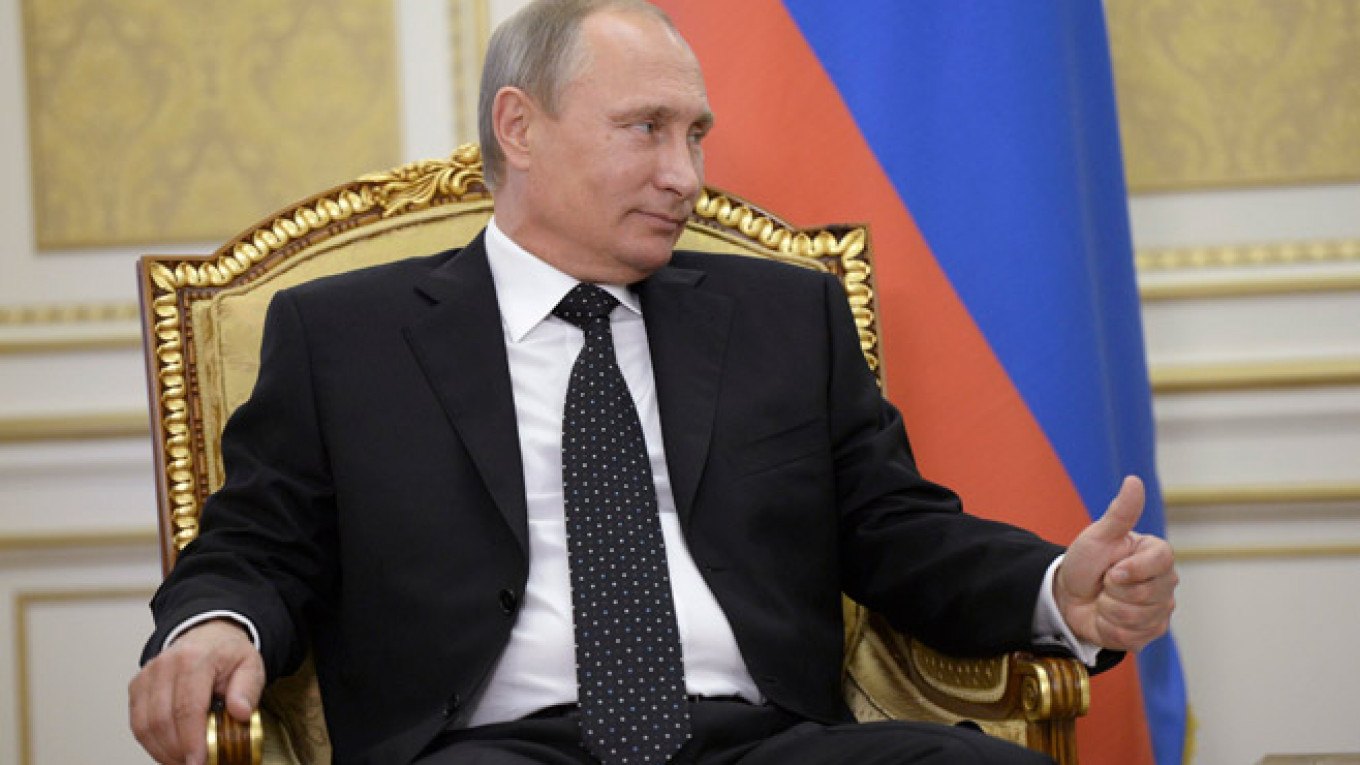Watching Russia's worrying trajectory under President Vladimir Putin, many foreign observers ask how a leader who is apparently driving his country toward the abyss can remain so popular. The answer is simple: Putin's supporters — that is, a hefty majority of Russians — do not see the danger ahead.
According to the independent Levada Center pollster, Putin's approval rating increased from 65 percent in January to 80 percent in March, after Russia's annexation of Crimea. The rate reached its peak in August, at 87 percent, when many believed that Russia and Ukraine were on the brink of war. Though it fell after that, to 84 percent in early September, the drop is within the margin of error. In other words, there is no basis to claim that Putin's approval rating is declining.
Russians now depend on their belief in Putin as much as he depends on their support.
Putin's startlingly high popularity certainly cannot be attributed to a positive view of state structures in general. Like most people, Russians are generally dismissive of bureaucracy. They give low grades to specific agencies, consider most officials to be corrupt and rate the government's performance on most issues as mediocre at best.
Instead, Russians' approval of Putin is rooted in the fact that there is no alternative. The Russian political field has been carefully cleared of all competition. Approval ratings in this context are not tools for comparing politicians' performance and prospects, and thus for compelling them to do better or risk being voted out in the next election. Rather, they are a reservoir of the population's hopes and fears.
During his first two terms, Putin was a strong source of hope, owing largely to the rapid increase in Russians' incomes. In 2012, this growth began to wane — and so did Putin's popularity. His 63 to 65 percent approval rating prior to the annexation of Crimea appeared high by Western standards, but was low compared with his previous record — and dangerously close to levels that would threaten his leadership. After all, an authoritarian regime built around a charismatic leader requires more than middling public support if it is to avoid unrest and violence.
In an attempt to recapture his former popularity, Putin implemented salary increases for teachers, doctors and police officers, putting regional budgets under strain in the process. But higher incomes did not translate into improvements in people's standard of living or the quality of public services, leaving Putin's approval rating flat, with some of his opponents even taking to the streets to protest his leadership. And, contrary to expectations, the Winter Olympics in Sochi also failed to revive Putin's popularity.
With the economy showing no sign of recovering, the robust growth rates that had bolstered Putin's popularity in the past, regaining support would have required undertaking the daunting task of fulfilling citizens' demands for better education, improved health care services, and more affordable housing. For Putin, the timing of the political eruption in Ukraine — with protesters eventually forcing the Kremlin-supported president, Viktor Yanukovych, to flee the country — could not have been more ominous.
Quashing perceptions of Putin as a "loser" in Ukraine became a top priority in Moscow. The strategy that emerged, beginning with the annexation of Crimea, delivered results almost immediately. The Russian public moved into "emergency mode," with Putin's approval rating soaring above 80 percent.
In such a politically charged context, the sociologist Boris Dubin observed, symbolic acts are more compelling than, say, economic considerations. Indeed, complaints about stagnating incomes and poor public services gave way to displays of unqualified support for the government, with citizens declaring their willingness to shoulder the costs of confronting the West.
Why did the Russian public accept confrontation so easily? Sharply divisive official rhetoric and the evocation of war imagery by state-owned media certainly played a role. But there is another, less obvious factor at work: Russia's lack of debt. It is easier to get carried away when not much is keeping you anchored.
According to the professional services firm Deloitte, mortgage debt in Russia is 20 times lower, on average, than in the European Union. And the National Agency for Financial Studies reports that only 2 percent of Russians are prepared to take on a mortgage, owing largely to the uncertainty that plagues the market.
For Western societies — weighed down by credits, contracts and other obligations — conflict is extremely costly, so they tend to resist it and even turn on leaders who suggest it. Ordinary Russians, by contrast, are willing to pin their hopes on a single charismatic figure, not only because they have fewer promising alternatives, but also because they face fewer constraints in doing so. In this sense, Russians have come to depend on their belief in Putin as much as he depends on their support.
Instead of serving as a source of stability, as it did in the past, this mutual dependence is driving Russia toward political and economic isolation — with serious consequences for ordinary Russians' livelihoods.
Sooner or later, Putin's approval rating will plummet. The challenge facing Russians is to ensure that, when it does, they have broken their destructive dependence on belief in him. Foreign observers, too, should abandon the habit of focusing all of their attention on the person at the top.
In the meantime, no one can predict the ends to which Putin will go to prop up his presidency.
Maxim Trudolyubov, an editor at the independent Russian newspaper Vedomosti, is a director at the Center for New Media and Society at the New Economic School in Moscow. Copyright: Project Syndicate, 2014.
A Message from The Moscow Times:
Dear readers,
We are facing unprecedented challenges. Russia's Prosecutor General's Office has designated The Moscow Times as an "undesirable" organization, criminalizing our work and putting our staff at risk of prosecution. This follows our earlier unjust labeling as a "foreign agent."
These actions are direct attempts to silence independent journalism in Russia. The authorities claim our work "discredits the decisions of the Russian leadership." We see things differently: we strive to provide accurate, unbiased reporting on Russia.
We, the journalists of The Moscow Times, refuse to be silenced. But to continue our work, we need your help.
Your support, no matter how small, makes a world of difference. If you can, please support us monthly starting from just $2. It's quick to set up, and every contribution makes a significant impact.
By supporting The Moscow Times, you're defending open, independent journalism in the face of repression. Thank you for standing with us.
Remind me later.








